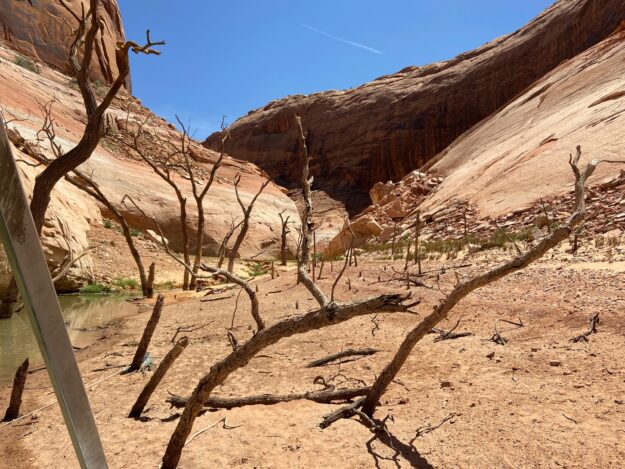Widgetized Section
Go to Admin » Appearance » Widgets » and move Gabfire Widget: Social into that MastheadOverlay zone
Feds move to cut water use in Colorado River Basin after seven states miss plan deadline

Federal officials on Tuesday moved to implement a series of emergency cuts to water use in the Colorado River Basin, after seven Western states missed a deadline to come up with a plan to do it on their own.
The cuts announced by the U.S. Bureau of Reclamation include reductions in annual releases from Lake Mead, the nation’s largest reservoir, where water levels have been dropping precipitously amid a severe, 23-year-long “megadrought” driven by climate change. To prevent levels from dropping further, water allotments from Lake Mead to Arizona, Nevada and the country of Mexico will be reduced between 7% and 21% for 2023.
The Bureau of Reclamation, which is overseen by the Department of the Interior, said it “will continue to seek consensus support” among water users in the seven Colorado River Basin states — Colorado, New Mexico, Utah, Wyoming, Nevada, Arizona and California — for substantial further cuts to offset projected shortages.
“Every sector in every state has a responsibility to ensure that water is used with maximum efficiency,” Tanya Trujillo, the Interior Department’s assistant secretary for water and science, said in a statement. “In order to avoid a catastrophic collapse of the Colorado River system and a future of uncertainty and conflict, water use in the Basin must be reduced.”
Lake Mead is on the border of Nevada and Arizona. The Colorado River headwaters are located in Colorado.
In June, Bureau of Reclamation officials gave states a 60-day deadline to commit to cuts for 2023 before the federal government stepped in. The four “Upper Basin” states — Colorado, New Mexico, Utah and Wyoming — responded last month with a five-point plan that did not include any mandatory cuts, maintaining instead that the bulk of reductions should come from the Lower Basin, which uses nearly twice the amount of water as the Upper Basin.
Certain Upper Basin interests are holding the Bureau of Reclamation hostage at this point.
– Kyle Roerink, executive director of the Great Basin Water Network
Last-minute negotiations reportedly held in Denver last week failed to produce a broader agreement between Upper and Lower Basin states.
While facing the urgent need for short-term cuts, the seven states are also engaged in high-stakes negotiations over the future of the 100-year-old Colorado River Compact ahead of the 2026 expiration of its current Drought Contingency Plan. Forty million people in the Western U.S. rely on water supplies from the Colorado River, where flows have been diminished significantly by a climate-driven megadrought that scientists say is more severe than any dry spell the region has experienced in at least 1,200 years.
Rebecca Mitchell, director of the Colorado Water Conservation Board, said in a statement Tuesday that the Upper Basin states had “met the moment” with their plan, which centers on voluntary pilot projects aimed at improving water conservation.
“Our focus now turns to implementation, including additional conservation efforts to maximize efficiency in all sectors,” Mitchell said. “However, this plan is ineffective without action in the Lower Basin. This will require leadership from the Department of the Interior through the Bureau of Reclamation, and bold action across the Basin.”
In a press release, however, the conservation group Utah Rivers Council faulted the Upper Basin states for failing to commit to reductions, calling their plan “a nothingburger letter designed to evoke the appearance of cutting water, while actually cutting no water whatsoever.”
“Certain Upper Basin interests are holding the Bureau of Reclamation hostage at this point,” Kyle Roerink, executive director of the Great Basin Water Network, said in a statement. “They have called the Bureau’s bluff time and again. Nothing has changed with today’s news — except for the fact that the Colorado River system keeps crashing.”
Editor’s note: This story first appeared on Colorado Newsline, which is part of States Newsroom, a network of news bureaus supported by grants and a coalition of donors as a 501c(3) public charity. Colorado Newsline maintains editorial independence. Contact Editor Quentin Young for questions: info@coloradonewsline.com. Follow Colorado Newsline on Facebook and Twitter.


